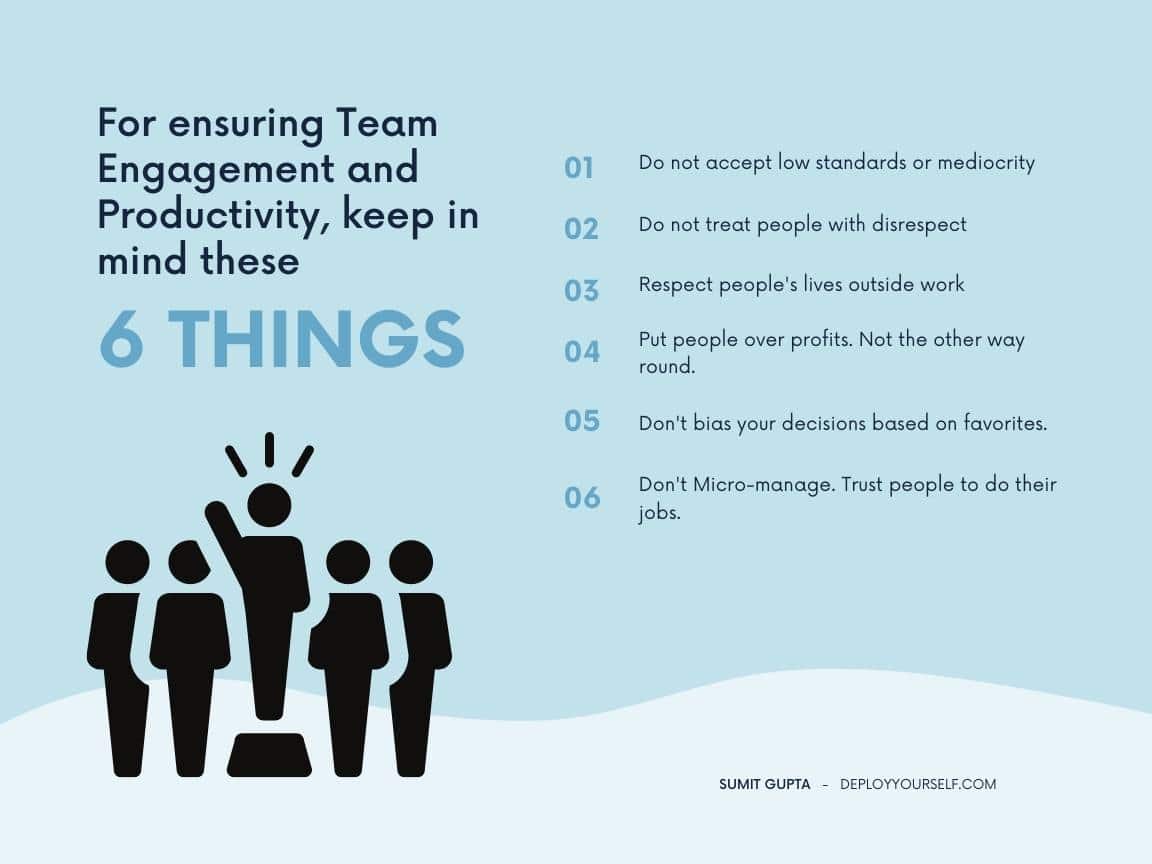While there are enough leadership experts, there isn’t any one-size-fits-all manual for leadership. That is because every team is different, every employee is different, and every leader is different. Leadership by definition means working with people, and people are more unpredictable and inconsistent than we might like to believe.
It is easier to cause damage as a leader by ignorance than it is to improve performance by deliberate intervention. Here are 6 things that you must avoid doing if you want to be a successful leader.
1. Do not accept mediocrity or low standards. Whatever standards you accept will become the norm.
In your desire to please people or avoid conflict, if you end up accepting low standards, then you are not doing justice to anyone in the team. People will fall down to the level of performance you expect from them.
In addition, nothing pisses high performers more than lowering your standards. If you let your standards slide, the first people to get frustrated and demotivated would be your best performers. If you continue to tolerate mediocrity, the high performers will soon start looking for other jobs.
Use the below guidelines when looking to raise performance standards in your team:
Lead by Example
Are you maintaining high standards in your own work? Your team is always looking up to you for guidance and motivation, modeling their performance to yours. Therefore, if you are not performing at a high level, you will likely notice the same in your employees. As such, model your behavior and performance to what you want to see in your team.
Make Your Expectations Clear
Making your expectations clear is one way of ensuring that people uphold high standards. This will allow you to hold everyone accountable to your expectations. Make sure people have deadlines and milestones for the various stages in the assignment. Moreover, have a clear and precise way of measuring performance standards.
Appreciate
Compliment high performers for a job well done. Doing this not only boosts that individual’s confidence but also communicates your standards to the rest of the team.
Coach
If a particular employee is performing poorly, try to determine what the barriers to their success are. Set small, achievable goals and provide support along the way. Make sure to acknowledge even the smallest of improvements. More often than not, you can help the employee improve their own performance by coaching them to see their own potential.
As former U.S. Secretary of State Colin Powell tastefully put it, “The more you tolerate mediocrity in other people, the more mediocre you become.” Therefore, as a leader, you should not only hold yourself to high standards but also ensure that your employees are doing the same.

2. Don’t treat people with disrespect. Even when they mess up.
How do you feel when someone disrespects you? Chances are you are not going to be too excited about collaborating with them. In the workspace, unfortunately, some leaders feel that their position allows them to treat their subordinates with disrespect.
Research shows that more than 50% of employees do not feel respected by their bosses. Such revelations are concerning, considering that employees have ranked being respectful as the most important leadership trait to them.
Whether it is saying good morning to the janitor or cleaning up after yourself, showing respect goes a long way. The following are some of the benefits of being a respectful leader:
Increasing Job Satisfaction
According to a 2014 survey done by the Society for Human Resources, up to 72% of the survey participants rated respectful treatment as being the most important contributor to job satisfaction. Employees who love their jobs are more productive since they want to be there. The reverse is also true; employees who are not treated with respect tend to have more conflicts at work, in addition to being more likely to miss work.
Increasing Employee Engagement
According to findings from a Gallup study involving more than 350,000 employees in the U.S., only 30% of the participants felt engaged with their jobs.
One of the easiest ways of increasing engagement is by treating people with respect. As mentioned earlier, employees consider respect to be the most important behavior in a leader. Therefore, by treating them well, they will be more likely to make your vision a reality.
Minimizing Conflict in the Workspace
Mutual respect creates a positive work environment and reduces gossiping, harassment, and other types of negativity. This ensures people work collaboratively and there are healthy disagreements rather than friction and conflict.
Reducing Stress
By treating your staff with respect, they will be more comfortable, as they do not have to worry about being ridiculed or humiliated. Being stress-free not only increases engagement but also goes a long way in promoting their mental well-being.
Improving Collaboration
Collaborative meetings often give birth to big ideas. When employees feel respected, they won’t shy away from sharing ideas. If employees always have to watch out for being humiliated or ridiculed, they tend to keep their ideas to themselves. This not only hurts them but also the entire organisation.
Disrespecting anyone, leave alone the people helping you to realize your goals, is a behavior that has no place in the 21st century. Nothing good comes from such behavior except pleasing the so-called leader’s ego.
3. Don’t force people to commit to deadlines or take on work that would mean spending time away from their families or ignoring their health.
Working during the weekend has become the norm in some countries. A survey of 1000 working Americans found that up to 67% of the participants typically worked during weekends, with 63% revealing that their employers expect them to do so.
This means that the typical boss sets deadlines that require their employees to work on weekends, which leaves them little time to spend with their families or embark on activities that refresh them both physically and mentally.
Doing that, however, could be counterproductive. According to one study, people who work long hours are 12% more likely to develop a drinking problem. Another study found that overworked employees are at a high risk of developing depression and heart disease.
Sick or worn-out employees are hardly the most productive workers. As such, it is important to allow them time to reset. According to psychoanalyst, performance coach, and author of “Be Fearless: Change Your Life In 28 Days,” Jonathan Alpert, “Reset time is critical, as it allows them to recharge and redirect their energy to other interests.”
Pushing people to work in their free time might lead to short term productivity benefits, but it leads to nothing but harm in the long term. Not only the business suffers due to a lack of engagement and productivity, but people’s health and well-being also take a hit.

4. Don’t put profits over employee well-being. Don’t push people to stress and burnout
Employees are people, not machines, meaning that they are susceptible to burnout. Human beings need regular periods of rest, rejuvenation, and play to recharge their batteries. Good leaders understand this and give their people the flexibility to work at their own pace. They encourage people to take their vacation days and make sure they stay energized and happy instead of only focussing on productivity.
Employee well-being and profits are not mutually exclusive. Often the most productive companies over the long run are those which prioritize employee well-being over profits. If your team has to meet unrealistic expectations, your team will be forced to cut corners and rush work. As a result, you will end up with low quality output.
Low Employee Morale
Hitting set targets is a big morale booster. However, if the goal is simply unattainable, people start feeling like they are not capable of achieving set goals. This can dampen their motivation, self-esteem, and productivity.
Increased Turnover
If an employee feels like they are not capable of meeting your expectations, they are likely to resign and look for other options, resulting in a loss of valuable expertise.
5. Don’t bias your decisions because of who and what you like.
Conflict among employees is bound to happen in the workplace. As a leader, it is your job to make decisions free of any bias or favoritism.
While most misunderstandings usually end up with the parties involved solving it among themselves, sometimes they don’t. It is in such cases where you have to step in with proper conflict management skills.
However, leaders often find themselves struggling to stay impartial when solving disputes, sometimes showing bias. This is because, as humans, we tend to take sides with opinions that resonate strongly with ours. Therefore, if the grievances of one of the parties in conflict have opinions you identify with, you might find yourself showing bias to their side of the story.
The effects of being partial when solving conflicts can be far-reaching. For starters, you undermine your own integrity as a leader. And then, you risk losing the respect of the rest of the team.
It is very important to hear the contrary position to what you believe in. This will make all sides feel heard, and you might even discover some new information that might change your mind.
6. Don’t micromanage. Trust people and let them do the work they were hired for.
Micromanaging is extremely detrimental to productivity, as it signifies distrust, thereby causing over-dependence and stress. According to Forbes Coaches Council, micromanaged teams are typically rebellious or incapable of making independent decisions.
As a leader, the last thing you want is to have people who are not confident in their abilities, as you will have to hold their hand every step of the way. The lack of belief in their skills coupled with the time lost verifying everything with you is the perfect recipe for wastage of energy and effort.
Instead of micromanaging, therefore, be a leader and trust people to do the job they were hired for. Give them the training and support required to do their jobs, and then get out of their way.
Conclusion
While there are a lot of guides on what to do as a leader, these above 6 things are a simple reminder of what you should not do. Sometimes it is easier to cause damage to team morale and engagement with one small misstep. If you keep the above guidelines in mind, you will set the foundation for a strong team.

Trackbacks/Pingbacks